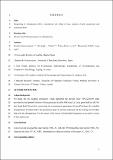Files in this item
Bargaining in chimpanzees (Pan troglodytes) : the effect of cost, amount of gift, reciprocity and communication
Item metadata
| dc.contributor.author | Bueno-Guerra, Nereida | |
| dc.contributor.author | Voelter, Christoph J. | |
| dc.contributor.author | de las Heras, África | |
| dc.contributor.author | Colell, Montserrat | |
| dc.contributor.author | Call, Josep | |
| dc.date.accessioned | 2019-07-01T09:30:06Z | |
| dc.date.available | 2019-07-01T09:30:06Z | |
| dc.date.issued | 2019-06-27 | |
| dc.identifier | 259098837 | |
| dc.identifier | 12a0087b-4a50-4b06-82a7-85345b382b31 | |
| dc.identifier | 85068213874 | |
| dc.identifier | 000492781400013 | |
| dc.identifier.citation | Bueno-Guerra , N , Voelter , C J , de las Heras , Á , Colell , M & Call , J 2019 , ' Bargaining in chimpanzees ( Pan troglodytes ) : the effect of cost, amount of gift, reciprocity and communication ' , Journal of Comparative Psychology , vol. Online First . https://doi.org/10.1037/com0000189 | en |
| dc.identifier.issn | 0735-7036 | |
| dc.identifier.other | ORCID: /0000-0002-8597-8336/work/59222310 | |
| dc.identifier.uri | https://hdl.handle.net/10023/18010 | |
| dc.description | Authors thank the two funding institutions which supported the present study: FPU12/00409 grant provided by the Spanish Ministry of Education and held by NBG and La Caixa grant held by AD. | en |
| dc.description.abstract | Humans routinely incur costs when allocating resources and reject distributions judged to be below/over an expected threshold. The Dictator/Ultimatum Games (DG/UG) are two-player games that quantify prosociality and inequity aversion by measuring allocated distributions and rejection thresholds. Although the UG has been administered to chimpanzees and bonobos, no study has used both games to pinpoint their motivational substrate. We administered a DG/UG using pre-assigned distributions to four chimpanzee dyads controlling for factors that could explain why proposers’ behavior varied substantially across previous studies: game order, cost for proposers and amount for recipients. Moreover, players exchanged their roles (proposer/recipient) to test reciprocity. Our results show that proposers offered more in the DG than in the non-social baseline, particularly when they incurred no cost. In UG, recipients accepted all above-zero offers, suggesting absence of inequity aversion. Proposers preferentially chose options that gave larger amounts to the partner. However, they also decreased their offers across sessions, probably being inclined to punish their partner’s rejections. Therefore, chimpanzees were not strategically motivated towards offering more generously to achieve ulterior acceptance from their partner. We found no evidence of reciprocity. We conclude that chimpanzees are generous rational maximizers that may not engage in strategic behavior. | |
| dc.format.extent | 589599 | |
| dc.language.iso | eng | |
| dc.relation.ispartof | Journal of Comparative Psychology | en |
| dc.subject | Ultimatum game | en |
| dc.subject | Dictator game | en |
| dc.subject | Fairness | en |
| dc.subject | Inequity aversion | en |
| dc.subject | Reciprocity | en |
| dc.subject | Chimpanzees | en |
| dc.subject | BF Psychology | en |
| dc.subject | NDAS | en |
| dc.subject.lcc | BF | en |
| dc.title | Bargaining in chimpanzees (Pan troglodytes) : the effect of cost, amount of gift, reciprocity and communication | en |
| dc.type | Journal article | en |
| dc.contributor.institution | University of St Andrews. School of Psychology and Neuroscience | en |
| dc.contributor.institution | University of St Andrews. Centre for Social Learning & Cognitive Evolution | en |
| dc.identifier.doi | https://doi.org/10.1037/com0000189 | |
| dc.description.status | Peer reviewed | en |
| dc.date.embargoedUntil | 2019-06-27 |
This item appears in the following Collection(s)
Items in the St Andrews Research Repository are protected by copyright, with all rights reserved, unless otherwise indicated.

